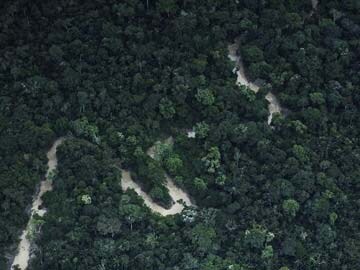
The Xinane river runs through Ashaninka Indian territory in Brazil's northwestern Acre state, March 25, 2014.
Reuters
Oslo:
Brazil has made good progress in safeguarding the Amazon rainforest but Indonesia's plans for its forests could face setbacks under a new government, a report commissioned by top forest aid donor Norway said on Monday.
Norway, rich from offshore oil and gas, paid 10.3 billion crowns ($1.7 billion) to slow tropical deforestation from 2008-13, according to the report by the state-funded Norwegian Agency for Development Cooperation (Norad).
"Brazil's deforestation rate and corresponding greenhouse gas emissions have strongly decreased," the report said of progress in protecting the Amazon, the biggest tropical forest.
Projects funded by Norwegian cash in Brazil were "paving the way for future reductions", it said.
Norway has paid Brazil 4.6 billion crowns ($720 million) to help back up domestic programmes, it said. Norway promised Brazil up to $1.0 billion in 2008 to slow deforestation, depending on its performance.
Under a similar deal in 2010, Norway pledged up to $1 billion to Indonesia, which has the third-largest rainforest after the Amazon and Congo basins and has cleared large areas to to make way for palm oil plantations.
Indonesia had made "good progress" in planning to protect forests, Norad said. But it said that "upcoming governmental change and weaknesses in the legal basis" for forest protection "present a serious risk that achievements may be lost".
President-elect Joko Widodo takes over form Susilo Bambang Yudhoyono in October. "There could be new priorities," Ida Hellmark, who coordinated the report at Norad, told Reuters, pointing to risks of a further shift to palm oil plantations.
So far, Indonesia has so far got just 2 percent of Norway's total payments, Norad said.
Forests soak up carbon dioxide as they grow and release it when they rot or burn. Deforestation, mainly to clear land for farms, accounts for up to about a fifth of all man-made emissions of greenhouse gases, according to U.N. estimates.
Cash promised by Norway accounts for more than 60 percent of all funds pledged by rich nations linking forests and climate change, the Norad report said. Norway's money has also gone to international agencies and nations such as Guyana and Tanzania.
Dag Hareide, head of environmental group Rainforest Foundation Norway, said Norway's aid had helped put a focus on forest losses and climate change at a time when many donors were facing austerity at home.
Still, he told Reuters that Norway could do more, especially to ensure that its $880 billion sovereign wealth fund avoided investing in companies that stoke deforestation.
Norway, rich from offshore oil and gas, paid 10.3 billion crowns ($1.7 billion) to slow tropical deforestation from 2008-13, according to the report by the state-funded Norwegian Agency for Development Cooperation (Norad).
"Brazil's deforestation rate and corresponding greenhouse gas emissions have strongly decreased," the report said of progress in protecting the Amazon, the biggest tropical forest.
Projects funded by Norwegian cash in Brazil were "paving the way for future reductions", it said.
Norway has paid Brazil 4.6 billion crowns ($720 million) to help back up domestic programmes, it said. Norway promised Brazil up to $1.0 billion in 2008 to slow deforestation, depending on its performance.
Under a similar deal in 2010, Norway pledged up to $1 billion to Indonesia, which has the third-largest rainforest after the Amazon and Congo basins and has cleared large areas to to make way for palm oil plantations.
Indonesia had made "good progress" in planning to protect forests, Norad said. But it said that "upcoming governmental change and weaknesses in the legal basis" for forest protection "present a serious risk that achievements may be lost".
President-elect Joko Widodo takes over form Susilo Bambang Yudhoyono in October. "There could be new priorities," Ida Hellmark, who coordinated the report at Norad, told Reuters, pointing to risks of a further shift to palm oil plantations.
So far, Indonesia has so far got just 2 percent of Norway's total payments, Norad said.
Forests soak up carbon dioxide as they grow and release it when they rot or burn. Deforestation, mainly to clear land for farms, accounts for up to about a fifth of all man-made emissions of greenhouse gases, according to U.N. estimates.
Cash promised by Norway accounts for more than 60 percent of all funds pledged by rich nations linking forests and climate change, the Norad report said. Norway's money has also gone to international agencies and nations such as Guyana and Tanzania.
Dag Hareide, head of environmental group Rainforest Foundation Norway, said Norway's aid had helped put a focus on forest losses and climate change at a time when many donors were facing austerity at home.
Still, he told Reuters that Norway could do more, especially to ensure that its $880 billion sovereign wealth fund avoided investing in companies that stoke deforestation.
© Thomson Reuters 2014

